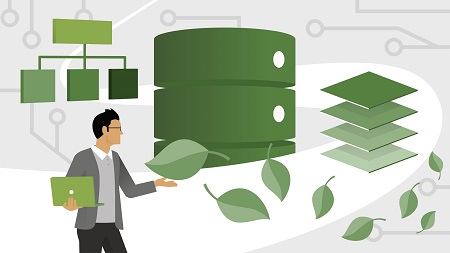
English | MP4 | AVC 1280×720 | AAC 48KHz 2ch | 2h 22m | 301 MB
Excelling in an ever-changing software development world requires true “full stack” experience. Knowledge of nonrelational databases in particular adds exciting new capabilities and features that make everyday development easier, more streamlined, and vastly more scalable. This course provides an introduction to using MongoDB, one of the most popular nonrelational databases. Discover how to create documents to store data, organize documents in collections, and write queries to read, update, and delete documents. Instructor Justin Jenkins also shows how to properly index data to increase performance in MongoDB, and then shows how MongoDB can be integrated with applications written in Python, Node.js, and PHP. In the final chapter, he covers basic server administration, including replication, sharding, security, and backups. Make sure to practice your newfound MongoDB skills using the challenge and solution sets issued along the way.
Topics include:
- Installing MongoDB on Windows and macOS
- Creating documents and collections
- Working with operators and arrays
- Writing queries to update and delete data
- Creating basic indexes
- Coding with MongoDB and PHP, Node.js, and PHP
- Maintaining MongoDB
- Implementing security
- Backing up and restoring MongoDB
Table of Contents
1 Modern database and application design with MongoDB
2 Why MongoDB-
3 Install MongoDB on Windows and import data
4 Install MongoDB on macOS and import data
5 Create a document
6 Using .find() to query documents
7 What can we store in a document-
8 Collections
9 Challenge- Create a recipe document
10 Solution- How to create a recipe document
11 Sort, limit, and skip
12 Working with operators and arrays
13 Updating documents
14 Updating arrays
15 Deleting documents
16 Challenge- Write a query
17 Solution- How to write a query
18 How we need to think differently
19 Basic indexes
20 How to use GridFS to store files
21 Challenge- Avoiding joins
22 Solution- Avoiding joins
23 Python
24 Node.js
25 PHP
26 MongoDB config file
27 Replication
28 Sharding
29 Authentication and authorization
30 Backups
Resolve the captcha to access the links!